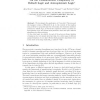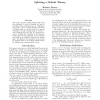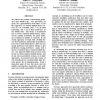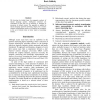120
click to vote
LATA
2012
Springer
13 years 9 months ago
2012
Springer
We investigate the application of Courcelle’s Theorem and the logspace version of Elberfeld et al. in the context of the implication problem for propositional sets of formulae, t...
169
click to vote
JELIA
2010
Springer
15 years 16 days ago
2010
Springer
In this paper, we show that Reiter’s default logic in the propositional case can be translated into answer set programming by identifying the internal relationships among formula...
136
click to vote
JOLLI
1998
15 years 1 months ago
1998
When reasoning about complex domains, where information available is usually only partial, nonmonotonic reasoning can be an important tool. One of the formalisms introduced in thi...
119
click to vote
AI
2000
Springer
15 years 1 months ago
2000
Springer
We introduce an alternative conceptual basis for default reasoning in Reiter's default logic. In fact, most formal or computational treatments of default logic suffer from th...
121
click to vote
CI
2004
15 years 1 months ago
2004
We present a general approach for representing and reasoning with sets of defaults in default logic, focussing on reasoning about preferences among sets of defaults. First, we con...
153
click to vote
AAAI
1996
15 years 3 months ago
1996
This paper presents mathematical results that can sometimes be used to simplify the task of reasoning about a default theory, by \splitting it into parts." These so-called Sp...
138
click to vote
IJCAI
1997
15 years 3 months ago
1997
We address the problem of introducing preferences into default logic. Two approaches are given, one a generalisation of the other. In the first approach, an ordered default theory...
114
click to vote
FLAIRS
2004
15 years 3 months ago
2004
We develop the default logic for pragmatic analysis of natural language queries. Ambiguous sentences are considered so that each set of meanings is assigned an extension of defaul...
125
Voted
LANMR
2007
15 years 3 months ago
2007
Abstract We introduce some differences in the style defeasible information is represented and inferences are made in nonmonotonic reasoning. These, at first sight harmless, chang...
118
click to vote
SIGLEX
1991
15 years 5 months ago
1991
Explaining how the meaning of words relate to the meaning of the utterance in which they are used is of utmost importance. The most common approaches view the meaning of an uttera...




